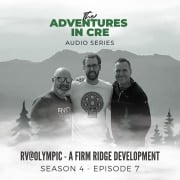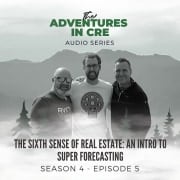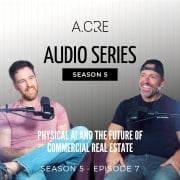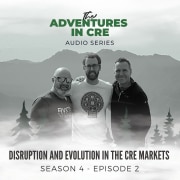How to Win a Real Estate Case Competition | S3SP18
Real estate case competitions are a great opportunity for real estate students to show what they know and practice skills used in the real estate industry. Winning a competition can be a great achievement and both improve a student’s future and showcase their passion for the industry. In this Audio Series episode, we explore the success story of Monty McClendon and Justin Du from the University of Texas at Austin, who recently won the Undergraduate Real Estate Case Competition in Austin. We delve into their strategy, preparation, and execution, and provide some insights on how to win a real estate case competition.
Watch, listen, or read this episode below to hear some valuable tips on how to succeed in a real estate case competition and how Monty and Justin did just that.
How to Win a Real Estate Case Competition
Or Listen to this Episode
Resources from this Episode
- A.CRE Real Estate Financial Modeling Career Accelerator
- Education in Real Estate
- Deep Dive on the Undergraduate Real Estate Program at the University of Texas at Austin
- About Real Estate Case Competitions
Episode Transcript
Announcer (00:01):
Welcome to the Adventures in CRE Audio Series. Join Michael Belasco and Spencer Burton as they pull back the curtain on everything commercial real estate and introduce you to some of the top minds in the industry. If you want to take your skills to the next level and be part of a growing community of CRE professionals across the world, this is for you.
Sam (00:26):
Hello and welcome back to another Adventures in CRE podcast. We’re excited because this one kind of goes back to Spencer and Michael’s roots, back in the day, back when they were at school and they were doing a lot of things, learning the game and potentially preparing for case studies. And so that’s what we’re going to be talking about here today if you’re preparing for a case study competition.
(00:48):
So Spencer, I want you to take me back to those days when you were prepping and just give the audience an overview of what it means to prep for a case study, and then do a quick intro to our guests here.
Spencer Burton (01:01):
Yeah. So one of the most valuable experiences that real estate students have are to compete in real estate case competitions. Whether at the undergraduate level or at the graduate level, there are a whole host of real estate case competitions that I’ve found very valuable.
(01:23):
And so Monty and Justin, University of Texas, they’ve joined us. They recently competed in a case competition. Michael and I both have competed in several case competitions, and we thought, hey, let’s talk about how to prepare, how to succeed for our listeners, A, who might have an interest in a case competition, maybe they’re preparing right now, or if you’re just a general real estate professional and you’re curious about how real estate case competitions work, we’ll go through that today. So maybe Monty, we’ll start with you. First, introduce yourself, and then why don’t you help the audience understand what is the general frame for a real estate case competition.
Monty McClendon (02:04):
Yeah, absolutely. I’d love to. So I’m Monty, Monty McClendon. I’m a sophomore at the University of Texas at Austin. Been interested in real estate for a good little while now, thanks to no small part to A.CRE. Thank you all for that.
(02:17):
So yeah, I competed in my second case competition this February at the Undergraduate Real Estate Case Competition in Austin. So just kind of the framework of how it worked is you got two weeks before the competition, we received a, well, we signed up with our team and we received an email that contained a bunch of information about a potential investment in single-family rentals and an operating company, a property management company.
(02:44):
So basically, we had a week or two weeks, Justin, feel free to correct me, where we were allowed to work on the case and try to come up with an investment thesis to present to a panel of judges based on this investment opportunity. So ultimately, we put together that deal, presented our findings to the judges, and they liked what they saw and we won.
Spencer Burton (03:05):
Excellent. So Justin, introduce yourself, and then add some color to Monty’s comment. And in particular, what was the most challenging element of that real estate case competition that you guys won?
Justin Du (03:17):
Of course. My name is Justin Du. I’m a senior here at UT Austin studying general finance and business owners. I think the most challenging aspect from my point of view was, so we had all of our analysis and kind of research for the case, and the hardest part for me was, or I guess all of us was trying to put it in a coherent way where it made sense and flowed through the presentation just because I feel like presentation is such an important aspect of case comps in general.
(03:56):
As far as the day-to-day, I think probably the first couple days or maybe even the first week, we all kind of analyzed the case on our own, and then it was at that point we all came together, hashed out all of our ideas, tried to get a consensus on our vision. And then from there, it was just kind of grinding out the presentation, streamlining it, and working on our presenting skills so that when we present to the judges it was coherent and made sense.
Michael Belasco (04:30):
Got it. So walk us through a little bit, first off about how many schools are involved. Is there more than one team from one school? How did you guys get selected or was it a signup process to get in, and how is that typically working?
Monty McClendon (04:45):
So this one specifically was mostly just limited to students from the University of Texas. There are other more national ones that happen all the time and those ones are a little bit more in depth in their selection process. But for this one, since it was just at UT, we kind of knew the people who were putting it on. So it was much easier for us to throw our hat in the ring. Yeah. Justin, do you have anything to add to that?
Justin Du (05:12):
No, you pretty much covered it. There were five to six teams. It was a little more straightforward than other case comps. We just had to present once. There was no semi-final and final. So we just present once, and then the judges kind of gave their judgment at the end of it, and yeah.
Michael Belasco (05:35):
Got it. So what types of information are you guys receiving? So you guys start, it’s that two-week mark, all of a sudden you get inundated with all this information. And you were alluding to, Justin, all the difficulty of organizing this wave of information. What is it that comes at you? What is all the stuff that is presented to you just in day one?
Monty McClendon (05:54):
Right. So usually in the beginning of the case you received, there’s some sort of overview of the opportunity telling you the asset class, the geography, any numbers that are particularly important, what type of deal they’re looking for. So this one was a little bit more complicated than previous case competitions I did because you were kind of analyzing two investments in one, one into a property management company and then one into a portfolio of single-family rentals.
(06:21):
So other than that, it’ll give you kind of more stuff that you need to know about the deal itself. But beyond that, learning about the market, about what’s going on in those different geographies, and understanding your the firm that you’re representing and understanding their goals and what they want. That’s kind of up to you. So you have to bridge what’s said in the case and the investment overview and the deal specifically with the context that you find by researching the market and just kind of conducting your market research in general. And then you have to then find a way to present that to the judges in a way that makes sense. And then you can build on that with your financial analysis. That’s kind of how it worked for us, right, Justin?
Justin Du (07:09):
No, that’s exactly that. And then I know an important thing for me when I was looking through it was always reading it in the mindset or of the framework of you are this particular company with this particular goal, because otherwise your mind can go everywhere. So reading it, saying, “Oh, we are this fund and we want to invest in single-family rentals,” really helped us frame it for the judges of why this was a good investment opportunity and explaining our reasoning behind everything.
Spencer Burton (07:48):
Well, I think that’s what makes real estate case competitions so valuable is that they’re real to life. For the audience, and I’ll be interested to hear Monty and Justin, if you’ve explored competing in other case competitions, but these are now ubiquitous across real estate education.
(08:08):
I did ULI Hines, which is a combination of a finance and a design competition. And so on our team we had half design professionals, half call it financial investment sort of professionals. I say professionals, we were students at the time. I did the National Challenge, which is also a UT Austin-sponsored case competition, national, but at the graduate level. But numerous other universities, I know Northwestern puts on a competition, Cornell puts on an undergraduate competition. University of Wisconsin puts on a competition.
I think most universities now are putting on competitions. They’ll either invite universities from around the country to come in and compete or they may compete. I know that, I believe, I think it’s UC Berkeley and Stanford have a competition where they compete against one another. They’re incredibly valuable. So first off, if you’re listening and you have the opportunity to do a case competition, highly recommend it.
(09:03):
What about preparation? So there’s one thing is that you get the case and you start going. I can speak to this and happy to, but I’d be curious maybe first to you Justin, what preparation did you and your team do prior to the real estate case competition to ensure that you would be able to compete and win?
Justin Du (09:23):
I’d say what was really helpful, there was kind of a, call it an info session or just kind of expectations from the Real Estate Center laying out what they wanted to see just in general for case comps because a lot of the participants were underclassmen like Monty, and even freshmen. So that was helpful just to be on the same page and being on the same page of the team.
(09:51):
But as far as maybe research or hard preparation in terms of looking at the real estate market analysis, things like that, to be frank, we didn’t really do too much. We were just all kind of waiting for that case summary to drop, and then from there we hit the ground running. Monty, I don’t know if you have anything different from that.
Monty McClendon (10:15):
Yeah, absolutely. So I guess as far as preparation before the case competition, it’s just kind of your standard advice. If you’re an undergraduate student interested in real estate, you need to be reading real estate literature, you need to be reading the news about real estate. So just kind of understanding what’s going on in the market, in kind of the different submarkets, geographic submarkets around the country. And then understanding, what was going on with the interest rates ended up being really, really important in the real estate case competition.
(10:41):
So before we knew what was going to be in the case competition, we all tried to go in with a solid understanding of what was going on most generally just through reading, whether it be through CoStar or Green Street or just the other news.
Spencer Burton (10:55):
Let me echo that, how important that is. So understanding the latest trends in real estate, understanding the general sentiment in the real estate industry. I was a judge in a case competition, I don’t know, six months back, and the team that won the main differentiator, because from a judge’s perspective you might get different ideas and some ideas are more compelling than others, but what really differentiates one team from the next is the team that clearly gets it. And you get it through, just as Monty described, understanding the industry.
(11:31):
And so it’s reading GlobeSt, it’s reading CoStar, it’s reading Bisnow, it reading Green Street, it’s following The Wall Street Journal and Bloomberg and understanding what’s happening in the more macro financial markets and how that impacts real estate so that when you go into that case competition and the judges start peppering you with questions because that’s the process. You present and then there’s a series of questions where… And these judges generally are well-respected people in the industry that are transacting on a day-to-day basis. And they’re going to start asking you questions and it’s very clear if you actually know what you’re talking about or not. Monty, what would you add to that?
Monty McClendon (12:07):
Yeah, you hit it right on the head, you need to be reading. Because the bolts are going to fly when they start asking questions, so you can’t flinch. That kind of leads me into my biggest piece of advice for people participating in real estate case competitions actually. And it’s you have to think of it kind of, it’s a little bit of a show. You have to give off the impression that you know what you’re talking about and you need to find a way to differentiate yourself from the other teams who are participating in the case competition. And the easiest way to do that is to speak with confidence and know what you’re talking about. And that all starts with reading Green Street. It all starts with doing the Real Estate Accelerator through A.CRE. And so that’s just kind of the general advice that I’d give.
Spencer Burton (13:01):
So Sam, of the five of us on the call, I think Sam is most equipped to speak to the performance element. So a real estate case competition, you ultimately get in front of judges, and to Monty’s point, you are making a case for your idea. Now, there has to be substance behind that, so I’m not… But you are very much marketing yourself.
(13:24):
Advice, Sam, that you’d give someone, they get up on stage or they get in front of judges and they’re a little nervous and they spent now weeks preparing or in some case days, just depending on the case. What’s some advice to help people as they’re doing that presentation part of this?
Sam (13:39):
What a curveball. That’s kind of an interesting question. And it’s funny because as you were talking about this and were talking about being educated, so all the preparation, so that stuff, put that aside. But when you’re in front of anybody and you want them to look at you and think that’s exactly solving all my problems. That’s exactly, it’s addressing the nature of the problem and it’s creating a solution. The best thing you can do, it’s basically a framework problem, discovery, solution. And most people jump to solution. They spend a little bit of time on we’ve been asked to assess the needs of this and that and the other, and then they just go to here’s what we’re putting together or whatever the case may be. The more you demonstrate that you deconstructed the problem, the more you will infer that you have the solution.
(14:35):
And again, I don’t compete in these competitions, but I imagine that there’s certain dynamics within the market that they’re presenting to you. I imagine that most of the competitors in that space just kind of gloss over them. And since Monty, since you do all the research and you’re taking the courses, it equips you to see a dynamic, to see a problem. The more you can deconstruct the problem, the more the people that you’re communicating with think, okay, because this person understands that problem so much, they’ve got a solution. Okay? So by the time you get to your solution, it’ll make sense.
(15:16):
Now, the discovery part, that’s the interesting part of presenting an idea because discovery is, “Okay. Well, you understand my problem, you demonstrated that by deconstructing it. How did you discover how to solve it?” So that story comes in. You can say, “Listen, there’s headlines coming across the news. Everybody’s talking about what Jerome Powell’s going to do. And Wall Street thinks that this is what’s going to happen with interest rates. With our research and with this particular property type, this investment vehicle, we’ve concluded based on this, that this is the appropriate course of action.”
(15:54):
So basically, you embody the ideas of your end product, the thing that you’re going to deliver in a story, right? Because then that gives that believability, that credibility, that borrowed credibility in some cases to your idea. So by the time you get to your solution, you have so much momentum and credibility and context to your presentation that all of the parts that you don’t explain become inferred.
Spencer Burton (16:25):
That’s a really good point. One of the differences between a young real estate professional and a seasoned real estate professional is understanding the big picture. And so too often young professionals, they don’t see the forest for the trees. Every investment has a story around it. There are various parts, but ultimately there’s a story that weaves all those pieces together. Ttoo often, young real estate professionals give the what rather than the why or the how rather than the why. And the why to me is the big story. That’s the forest. The what and how are the trees.
(17:08):
And to Sam’s point, if you jump to the solution and you don’t demonstrate that you actually understand the problem and how you discovered a solution to that problem, you can’t make a compelling case. And as a judge, they may agree with the solution, but they may not believe that the team actually understands why that solution came about. Michael.
Michael Belasco (17:33):
Yeah. And so the presentation needs to be structured and calm. You’re presenting the problem in clear, succinct, in a patient manner, then you present the solution, then you provide the proof and the why to that solution and the presentation, if you’re prepared with all of that. And Sam, you said something to me a while ago. I actually wrote it down. It’s on my whiteboard here. It’s problem promise, proof proposition, which I’m sure you heard from somewhere, and we talked about that.
(18:02):
But you go through that in a succinct order and you deliver that message clearly, you’re walking people along on that story. And so that’s the thing. There’s that and then there’s the background to the process, and then there’s the actual delivery, which is talking slower also. I’m talking about just the semantics of actually presenting. The slower you talk, the more control you have. And as long as you have that clear message and the preparation behind it, it’s going to deliver very strongly, especially when you’re in front of an audience, preparation, take a deep breath, know your heartbeat’s going faster, and just talk slower.
Spencer Burton (18:40):
That’s right. So we just have a couple minutes left and I want to get to this last question, and this is both for Monty and Justin. To the skeptical students out there who say, “I’ve got too much going on between job search and classes,” and whatever else it may be, why should they commit time to a real estate case competition? Start with you Monty, and then we’ll give Justin the last word.
Monty McClendon (19:06):
Sure. Okay. Yeah. So I would say to the skeptic, you really need to approach a real estate case competition with a learner’s mind. You need to understand that you’re a student and real estate isn’t just learned by reading a book. You got to learn by doing. And real estate case competitions provide a low-stakes environment to make mistakes and learn by doing, exactly like I said.
(19:27):
So if you’re kind of an underclassman, you don’t really know how to model, it’s a great opportunity for you to learn how to improve as a speaker, improve as a storyteller, or learn how to professionally format slides or learn how to do really, really in-depth market research. If you’re kind of an upperclassman or if you’re just an underachieving, underclassman and you’d like to learn a little bit more about financial modeling, this is a great opportunity to do a deep dive and really kind of figure that out.
(19:55):
So yeah, they do take a lot of time, but really just the opportunity to learn is really what sells the opportunity. And also, I’ll let Justin talk about this, but sometimes there’s money involved, so that’s another nice thing.
Michael Belasco (20:12):
Wait, before we move on, Justin, real quick, I want to just emphasize what Monty said. This is a low-stakes environment to make mistakes. I love that you said that because I remember being a student and feeling like the case competitions were this huge pressure, like I’m getting in front of industry professionals and this is it, this is do or die. But it is not like that. It is a learning environment. And I really love that you said that, it is a low-pressure environment to make mistakes in front of professionals and learn from them. And there’s no fear in that, so thank you.
Spencer Burton (20:43):
Yeah, it’s interesting you say that, Monty. One of the reasons why the Accelerator is case-based, 17 cases in a row, is because, to Michael’s point, to your point, it’s a low-stress, zero-risk environment where you can take chances and practice because eventually you’ll be working with real money and then the stakes actually matter. Let me give one other idea, and then Justin the last word.
(21:09):
Why do a real estate case competition? The job search is an exercise in touches. So the more interactions you can have with a perspective firm, the higher the probability that you make it through multiple rounds of interviews.
(21:28):
In my situation, I interacted with individuals who were at the firms I eventually got my internship with and then my full-time job coming out of business school. And in both cases, the case competition came up during interviews and in one case, my full-time, a recommendation came back from one of the judges to the hiring manager based on my performance in the real estate case competition.
(21:54):
And so not to put pressure actually to Michael’s point, but on the flip side, it is real opportunities to demonstrate your understanding. If you’re prepared, real opportunity to ultimately get a job. All right. Justin, last word. Why do case competitions?
Justin Du (22:08):
I think you guys really covered all of the key points. So I think I’ll just echo again Monty’s point of really it’s all about learning. And yes, you learn. UT’s been great, great education for real estate, business, finance, all of that, but case comps are such a good way of bridging between what you learn in class and then what you’ll eventually end up doing in your internship, full-time, all that sorts of stuff. Because it is really kind of drinking from a fire hydrant, right? This learning curve is so steep, but you learn so much at the end of it. And it was a great experience. And then also we do get to work on more professional presenting, which may be different from your other classes, which will help you definitely for sure in full-time internships, all that sorts of stuff.
Spencer Burton (23:01):
Yeah. Well, congrats again guys. It’s pretty cool to see you win. I hope you continue to do real estate case competitions. Sam, I’ll let you wrap it up for us.
Sam (23:08):
Yeah, it’s been a lot of fun. Thanks for involving me in the podcast. I was sitting here thinking I have never done one of these, but you’re absolutely right, there’s some things that you can do to really get your point across and your ideas. And I’ll finish with one quote. I think it’s from Confucius. I hope I don’t butcher it. But it is really timely.
And I think just to piggyback off of what Monty said. It’s “I hear, I forget. I see, I remember. I do, I understand.” And so no matter what you’re doing, joining a competition, trying to get a job, the more boots on the ground, the more effort you put in, the more you’re going to know, the better you’re going to be. And in these guys’ case, you might even win a competition. So thanks for listening to the podcast and we’ll see you on the next one.
Announcer (23:57):
Thanks for tuning into this episode of the Adventures in CRE Audio Series. For show notes and additional resources, head over to www.adventuresincre.com/audioseries.








